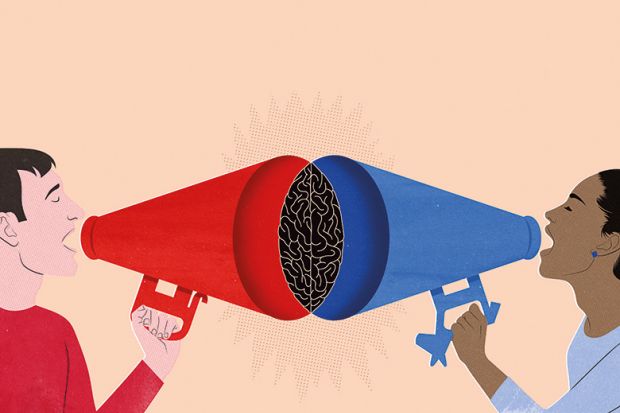It is widely believed that the proliferation of education, science and technology will help usher in a more rational, peaceful and prosperous age. Adherents see universities as the primary incubators of that better tomorrow, helping our best and brightest to hone the character, skills and knowledge to solve the world’s ills through reasoned, civil debate.
However, contemporary research in the cognitive and behavioural sciences suggests a much bleaker picture. For instance, rather than serving as an objective base on which agreements can be built, evoking scientific studies or statistics in the context of sociopolitical arguments tends to further polarise interlocutors. Both conservatives and progressives politicise science and evaluate its findings on an ideological basis, exaggerating conclusions when convenient while finding ways to ignore, discredit, defund or suppress research that threatens their identity or perceived interests.
Rather than contributing to open-mindedness or intellectual humility, greater cognitive sophistication or knowledge often renders people less flexible in their beliefs by enhancing their abilities to critique and dismiss challenges, or advance counter-arguments, regardless of “the facts”.
That is, if one wanted to create an environment that actually promoted closed-mindedness and dogmatism, contemporary research suggests the following prescription: consolidate society’s most intelligent, knowledgeable and charismatic people, at a time in their lives when their identities are just taking shape, in a competitive environment focused largely on the sciences. In other words, set up a university.
Perhaps, then, it should not be surprising that the long leftward trajectory of US institutions of higher learning seems to have culminated in the almost complete absence of conservative faculty, students and perspectives from many fields, while dissent from progressive ideology is met with increasing sanctions and scandal, from which even historical figures are not immune.
However you may feel about these developments from a moral or political stance, they are harmful for the practice and profession of science – especially the social and behavioural sciences.
One of the primary reasons that universities seek to recruit faculty and students from a variety of gender, sexual, ethnic, economic and other groups is to enhance viewpoint diversity. The idea is that integrating the unique life experiences, influences and perspectives of under-represented populations can enrich learning and research.
In other words, it is cognitive and ideological variation that gives substance to other forms of diversity on campus. The work of trying to understand, accommodate, contest or reconcile across different languages, cultures, disciplines and priorities, while often frustrating and exhausting, is precisely how the benefits of diversity are realised. Substantive diversity will generate contradictions and conflicts. It will challenge people – minority or otherwise – and make them uncomfortable. But it will ultimately produce stronger research and better scholars.
By contrast, too much cognitive and ideological homogeneity in a field creates a host of epistemological problems. Methodological weaknesses, gaps in research, errors and problematic assumptions can all be overlooked because the results of a study comport with what reviewers want to believe (contributing to the reproducibility crisis, which is especially pronounced in the social and behavioural sciences). Important lines of study are never even undertaken because antecedent commitments blind researchers to their value. And research that seems to threaten the prevailing consensus is often subject to unfair scrutiny by peer reviewers, making it difficult to publish.
Institutionalised bias adversely and unjustly affects careers, too. When students perceive ideological differences between themselves and their professors, they tend to give lower ratings in course evaluations. Defying a department’s prevailing ideological consensus can also harm scholars with regard to hiring and promotion. As a result, conservatives often feel compelled to conceal their political leanings and limit their exploration of controversial topics until they receive tenure – which less than one-third of US faculty possess.
Republicans now control the presidency, both house of Congress and most state legislatures and governorships. Yet, when it comes to crafting policy, conservative lawmakers tend to confine their attention to economists, whose field more closely approaches political parity (exhibiting a mere 4:1 progressive bias). Increasingly, they circumvent academics altogether, in favour of the thinktanks that have become repositories for right-leaning intellectuals alienated from the academy.
Given that more than 90 per cent of sociology faculty lean towards the progressive, there is virtually no incentive for conservative lawmakers to consult their research. Indeed, there is every incentive to defund it: hence the aggressive Republican-led campaigns to cut government support of post-secondary education, especially for the humanities and social sciences. Meanwhile, private universities designed to explicitly promote conservative ideologies are seeing a surge in donations and enrolments.
The fact that many US universities are so out of step with broader society is also contributing to declining public confidence in them – and a growing inability among social researchers to relate to ordinary people, undermining their capacity to understand phenomena, predict trends or craft effective interventions.
So the ideological homogeneity of contemporary academic institutions poses an existential threat to the integrity, credibility, utility and even viability of their social research. It is imperative that researchers better engage with conservative thought, and reach out to a polity that tends to be far more conservative than they are.
Musa al-Gharbi is a Paul F. Lazarsfeld Fellow in sociology at Columbia University and a research associate with the Heterodox Academy.




